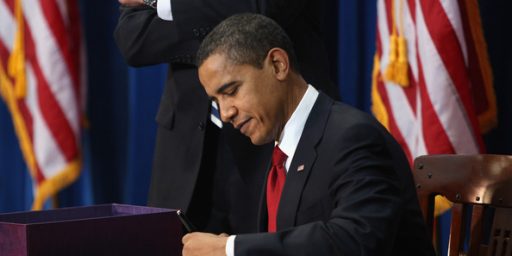James Hamilton on the Economy
A very good read, I highly recommend it. A couple of key points for me,
But where I may disagree with some of my colleagues is in their presumption that wage or price rigidities are the core frictions that are responsible for producing the present situation. I have in my research instead stressed technological frictions. For example, when spending on cars abruptly falls, there is a physical, technological challenge with getting the specialized labor and capital formerly employed in manufacturing cars into some alternative activity. In my mind, it is a mistake to pretend that any federal program is capable of immediately re-employing those resources into an alternative, equally productive enterprise. More fundamentally, I have suggested that our present situation is as if someone had quite successfully sabotaged the basic functionality of our financial system. Until we once again have a financial sector that can successfully allocate credit to worthy projects, we’re not possibly going to be able to produce as much in the way or real goods and services, no matter what the level of aggregate demand or stimulus package might be. In terms of the textbook Keynesian models that people play with, I’m suggesting that “potential” GDP growth for 2009:Q1– that growth rate which, if we try to exceed it by stimulating aggregate demand, we primarily just get more inflation– is in fact a negative number. I do not accept the proposition that there is a level of government spending– however large a number you choose to suggest– that will prevent the unemployment rate from rising above 8%. But I do believe that if the government borrows a sufficiently large amount, we will have to worry in a very concrete way about what will sustain the foreign demand for U.S. assets.
[…]
And unquestionably the number 1 priority for the federal government should be to restore a functioning financial sector. That in my mind should be done in a way that maximizes the return on any taxpayer funds invested.
But rushing through new government spending plans, just for the sake of spending? Count me off of that bandwagon.
His suggested policies are,
- Unrestricted block grants to states so that states don’t have to either cut spending, raise taxes or both.
- Spending on infrastructure.
I’d argue that the infrastructure spending is not really stimulus, unless Prof. Hamilton thinks the economy will be in a recession into 2010. Still it might be a reasonable investment irregardless and we should “have that discussion as a nation”. I think upgrading/improving parts of the infrastructure is probably worth while.
But nothing suggests we have to rush the legislation through and get the turds we have seen coming from both the Senate and the House.
On a side note, I like the idea of technological frictions. Well I don’t like them per se, but the idea that it is technological frictions that prevent markets from clearing vs. prices strikes me as a more…reasonable approach. I’ve always found the “menu cost” argument rather weak. Sure there are costs with changing the “menu”, but is it so large that you’d put it off for a significant length of time? But converting a factory that used to produce F150 pickup trucks to making something completely different and retraining the workers? Now that I can see as taking considerable time even is such a project is started right away. Anyhow, please go read the whole article. I think it makes a good case for some stimulus, but not what we’ve seen so far. What we’ve seen so far is crap for the most part.






Funny – I’ve quoted from this excellent piece myself, and when I did I picked up a fragment which is beneath your “[…]”:
odograph do you have any evidence that the stimulus package contains infrastructure improvements geared towards making “a significant contribution to future productivity”?
Cause, I’m seeing:
(a) shovel-ready road re-surfacing projects that would not impact future productivity;
(b) political payola in the form of road re-surfacing projects on roads that don’t need resurfaced;
(c) projects that failed cost-benefit analysis a few years ago that are championed by special interests;
(d) projects that states/local government were going to do anyway, but were cancelled so they could take bolster their pension problems.
The AP says this:
Should I just be an agnostic, and ask how one group of people can say we don’t need repaving, and another can claim little debate about the need?
BTW, I agree with Hamilton that it seems like the time for transmission lines:
I am surprised at the mass transit endorsement.
I think the disagreement is on whether or not it is stimulus spending. I don’t think even Prof. Hamilton would argue that it is. I think he sees the short run as being pretty hard to change, but good investments in infrastructure could have very nice benefits to productivity down the road.
odograph, you may want to read what the engineers say about this stimulas package:
Link
Well, it doesn’t really matter. We know what we are going to get, neither zero or two trillion. We’re going to get a messy bill in the middle, a little over half a trillion. It won’t be pure stimulus nor pure tax cut.
In a way extremists of both sorts can walk away happy. One half can say “too much, just watch” while the other says “not enough, just watch.”
I think there are good projects that can be done for much, much, less that the half a trillion total. Probably some of those ($5B transmission lines?) will be thrown out, while who knows … arts funding … will make it in.
I’m going to buy a new tv (Samsung LN46A650 ok?), and other than that settle down to see what happens. Sorry about my stimulus going to Korea …
(I’m not terribly worried about work showing up in 2010, because I don’t think 2010 will be stellar. Maybe it will be an up-year, but I wouldn’t think by much.)
Problem is sometimes doing something half-assed is actually worse than doing nothing.
Sigh. I think you would have to be an extremist to not think some level of effective govt stimulus was possible. There are ways. But modest and limited.
However, you would have to be delusional to think it was a big number that could be deployed responsibly and effectively. Witness the current situation. (Witness Japan.) And this comes with penalties.
As an owner in 6 companies I sometimes (now) have to admonish management teams to avoid the natural temptation to “do something.” Sometimes just hunkering down and paying attention to the basics is the correct and prudent strategy. Block and tackle. Block and tackle. In time, this too shall pass. In the interim…….do no harm.
I wish I could admonish government.
From a post Schuler did nearby: “The problem is that very often the best thing to do is to simply not do anything,†says Tschoegl. “But no politicians can bring themselves to stand up here and say, ‘We don’t have the faintest idea of what to do.”
Wiser words were never spoken. As I opened in this post, perhaps some modest things can be done. But what we are witnessing?:
An Obomanation. Pun intended.
Cough… Iraq… cough. Where’s my bridge over the Tigris.
You have no shame.
I’d be happy if I could believe the “do nothing” was … humane. I’d be OK. I’m still fairly secure in my semi-retirement. This job is in a sense gravy, so even if it is auto-related, and we have had lay-offs this week, I’m low-stress.
Of course, to the extent that I feel for my former coworkers …
But making things worse is? Just curious, bucause that is the context of this reply. Suppose you have two options:
1. Do nothing,
2. Make it worse by doing something.
Seems to me that 2 is the less humane thing to do. I have yet to see someone say, “This bill is fantastic and very little in it is bad or poorly thought out.”
Of course making things worse is, by definition ;-), worse.
I don’t think that case, that “nothing” is “safest” has really been made though. I mean, yes I get it at a gut level, but I’m not sure it’s been made economically … other than in this unfortunate political-economic binding that we’ve been seeing all through this.
People will tell us that spending is bad (and tax cuts are good), but they are the same people who always say that. They might be right, or stopped-clocks who are wrong.
(Steve, I don’t think you would argue that you’ve really changed your stripes on this one.)
Update: Tyler Cowen has an idea about consensus.